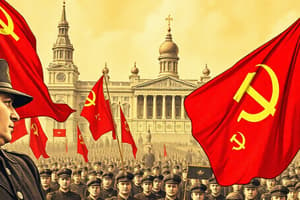Podcast
Questions and Answers
Who were the founders of the Bolshevik faction during the Russian Revolution?
Who were the founders of the Bolshevik faction during the Russian Revolution?
Vladimir Lenin and Leon Trotsky
What event in late 1917 led to the Bolsheviks seizing power in Russia?
What event in late 1917 led to the Bolsheviks seizing power in Russia?
The storming of the Winter Palace
What new concept was introduced by Lenin and his followers to foster unity and discipline within the Bolshevik party?
What new concept was introduced by Lenin and his followers to foster unity and discipline within the Bolshevik party?
'Democratic centralism'
What were the three main promises embodied in the motto 'Peace, Bread, Land'?
What were the three main promises embodied in the motto 'Peace, Bread, Land'?
What ideology did Leninism emphasize, focusing on class struggle and workers' rights?
What ideology did Leninism emphasize, focusing on class struggle and workers' rights?
Who's rise to power heralded profound changes to governance in the Soviet Union, characterized by intense consolidation and purges?
Who's rise to power heralded profound changes to governance in the Soviet Union, characterized by intense consolidation and purges?
Who were the key players in the Russian Civil War?
Who were the key players in the Russian Civil War?
What were the main factions involved in the Russian Civil War?
What were the main factions involved in the Russian Civil War?
When did the Russian Civil War end?
When did the Russian Civil War end?
Who led the Red armies during the Russian Civil War?
Who led the Red armies during the Russian Civil War?
What caused the Russian Civil War to erupt?
What caused the Russian Civil War to erupt?
What were the White forces aiming to achieve in the Russian Civil War?
What were the White forces aiming to achieve in the Russian Civil War?
Flashcards are hidden until you start studying
Study Notes
The Russian Revolution: A Decade of Transformational Change
During the early 20th century, one of history's most pivotal events unfolded across Russia – a cascade of transformations collectively known as the Russian Revolution. This period encompasses multiple phases marked by key actors, ideologies, and conflicts culminating in lasting consequences that continue to shape global politics today. Let's explore some crucial aspects of this remarkable era:
Origins of the Revolutions
The Russian Revolution began with unrest stemming from several factors, including economic hardship brought about by World War I and deepening political dissatisfaction among various factions within society. The Tsarist autocracy struggled to maintain control over these mounting grievances, prompting rapid change on numerous fronts.
The Russian Civil War
Following the abdication of Nicholas II and the collapse of Imperial rule, Russia descended into chaos and civil war between rival factions seeking to establish their vision for the country's future. Key players included the White (белые) forces led by multiple anti-Bolshevik generals and the Red (красные) armies of the Soviet government under Vladimir Lenin. This bloody conflict raged until 1923, resulting in significant losses of life before a fragile peace settled upon Russia.
The Bolshevik Revolution and its Leaders
One particularly influential faction during the revolution was the Social Democratic Labor Party, also called the Bolsheviks (большевики). Founded by Vladimir Lenin and Leon Trotsky, they advocated for a proletarian dictatorship leading to socialism and later communism. In late 1917, the Bolsheviks seized power through a series of bold maneuvers, including the storming of the Winter Palace, now famously recognized as the October Revolution.
Communist Ideology and Establishment of the USSR
Lenin and his followers introduced new concepts such as 'democratic centralism,' which aimed to foster unity and discipline while allowing room for internal debate and decision-making processes. With the establishment of Soviet rule in 1922, people soon embraced the promise of a better world embodied in the motto, "Peace, Bread, Land," echoing the slogan of the French Revolution. At the heart of this new system lay the principles of Marxism–Leninism, which emphasized class struggle and the eventual triumph of workers' rights.
However, it is essential to note that the journey towards realizing these lofty goals was far from smooth; Stalin's rise to power heralded profound changes to the nature of governance in the Soviet Union, characterized by intense consolidation and purges. Nonetheless, the impact of the Russian Revolution has been felt globally, serving both as a point of inspiration and cautionary tale for decades to come.
Studying That Suits You
Use AI to generate personalized quizzes and flashcards to suit your learning preferences.




